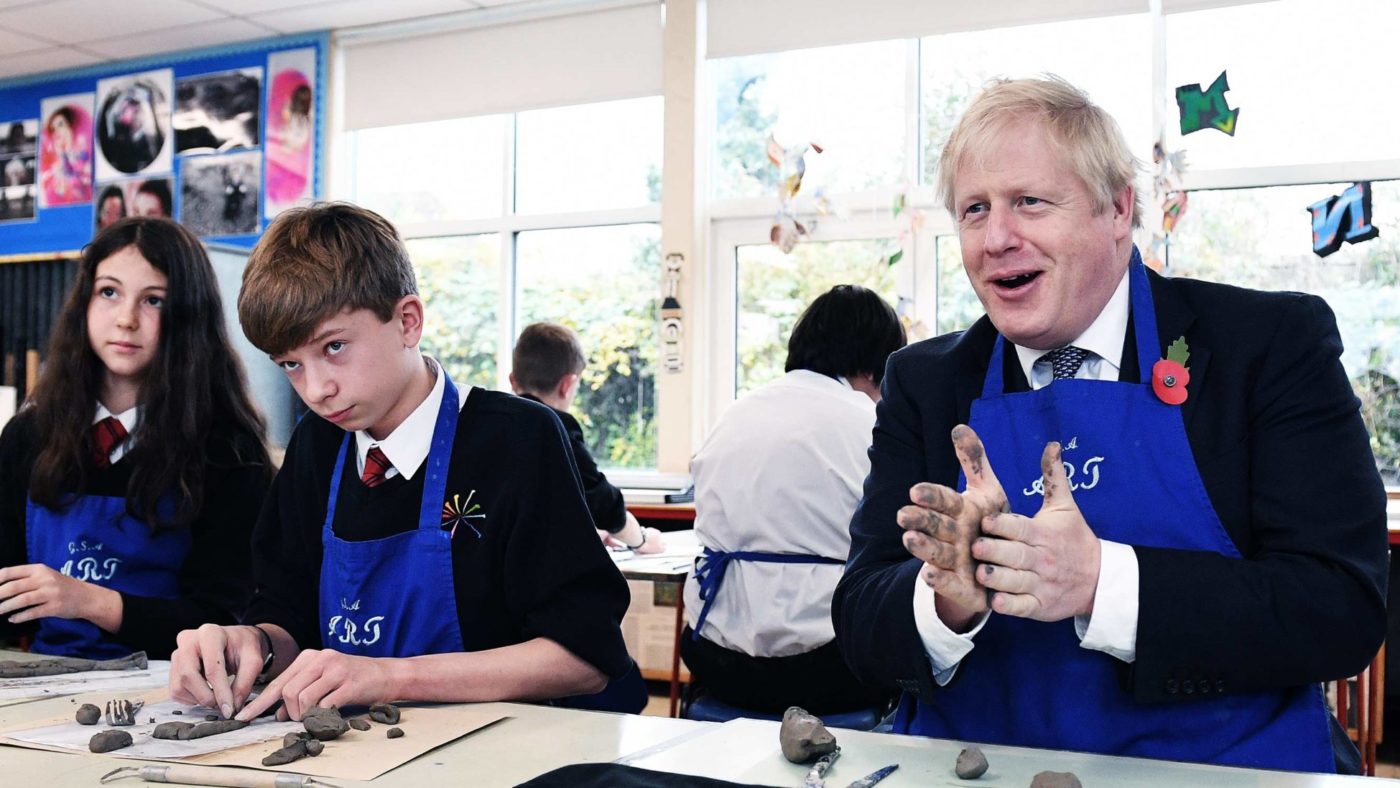When assessing the Conservative manifesto, the amount of space it affords a department or policy area seem a fair basis for making a rough judgement about how important the leadership thinks it is.
It is therefore slightly concerning that education, which was once at the very centre of David Cameron’s reforming project, gets but a single page.
I have written previously for this site about Boris Johnson’s pronounced preference for spending promises over policy innovation, and this section is entirely of a piece with that – it is even straightforwardly entitled ‘Invest in our schools’.
(There is also the intellectually interesting claim that “as Conservatives, we believe absolutely in equality of opportunity”. This is, for good reason, not true.)
Moreover, one and a half of its three columns of text amounts to a recitation of spending announcements the Government has already made. These apparently add up to £14 billion in extra funding, with a handy per-pupil amount thrown in, plus the move to raise starting salaries for teachers to £30,000.
The remaining half of the page, the bit with the actual new policies in it, comprises three bullet points.
One of these is also about spending money, specifically the Conservative proposals to “offer an ‘arts premium’ to secondary schools to fund enriching activities for all pupils” and “invest in primary school PE teaching”, alongside a commitment to “promote physical literacy and competitive sport”.
This leaves two. The first is on discipline: we learn that the Tories will “will back heads and teachers on discipline” and “back heads to use exclusions”; that they “believe that Ofsted inspection serves a valuable purpose” in improving behaviour as well as standards; and that a Johnson government will “continue to help teachers tackle bullying”.
So far, this is mostly of a piece with the quite traditional slant I noted in the list of bills the Government put forward in its most recent Queen’s Speech. Spending on arts subjects and extra-curriculars is different – and possibly a retail offer aimed at those well-heeled voters who might be flirting with the Liberal Democrats – but an emphasis on discipline and ‘competitive sport’ is exactly what you’d expect to find in a Conservative manifesto leading on immigration and law and order.
None of which is to say that these are bad policies. Far from it. But the extent to which the manifesto confines itself to this comfort zone is worth noting.
The final paragraph contains the remnants of Michael Gove’s great crusade. The headline promise is “we will create more great schools”, and it is here that we finally find some reference to provision.
It starts by saying that the party will continue to “support innovation”, citing the special maths schools “set up for the most gifted young physicists and mathematicians”. It will also “expand ‘alternative provision’ schools” for pupils who have been excluded – probably necessary if they’re going to back heads adopting a muscular exclusion policy – and “deliver more school places for children with complex Special Educational Needs”.
Meanwhile the institutions which were once the centrepiece of the entire Tory education agenda get a single line: “we will continue to build more free schools.” This is obviously welcome but given the collapse in parent-led school proposals, some detail on how the party plans to do this would be welcome. Meanwhile there is no reference to academies that I can see.
Free schools at least fared better than technical education, which goes unmentioned at all on the education page and only a fleeting mention (inevitably to “our investment in schools and technical education”) elsewhere. T Levels, the brand-new technical alternative to A Levels which the Government is set to introduce next year, are also conspicuous by their absence.
(It is an open question whether you ought to include apprenticeships, but as the party did not cover them on its education page, I will follow suit.)
This is not a new problem. The Conservative education crusade began running out of steam long before Johnson became Prime Minister, and I have previously written elsewhere about how Theresa May appeared unable or unwilling to properly back her own preferences for faith and selective schools even has her ministers took their feet off the gas on free schools. It also remains true that the Government is only likely to re-focus on domestic policy after it has ‘got Brexit done’.
But if this manifesto is supposed to give the Tories a five-year mandate (and I’m dubious about that) then this is a thin offering on what ought to be a crucial portfolio. Education, like housing, is a policy area where an ambitious government can effect quite profound changes in some of the central structures of national life. For all his flaws, Gove grasped that.
Click here to subscribe to our daily briefing – the best pieces from CapX and across the web.
CapX depends on the generosity of its readers. If you value what we do, please consider making a donation.


